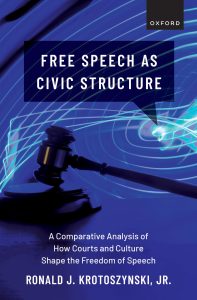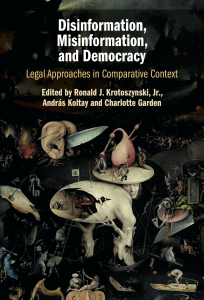
Professor Ronald J. Krotoszynski Jr. has two new books forthcoming: Free Speech as Civic Structure: A Comparative Analysis of How Courts and Culture Shape the Freedom of Speech and Disinformation, Misinformation, and Democracy: Legal Approaches in Comparative Context. Free Speech as Civic Structure has been published through Oxford University Press, and Disinformation, Misinformation, and Democracy is being published through Cambridge University Press next month. Free Speech as Civic Structure is a solo-authored monograph, whereas Disinformation, Misinformation, and Democracy is an edited volume, overseen by co-editors Krotoszynski, Dr. András Koltay (National University of Public Service, Hungary) and Prof. Charlotte Garden (University of Minnesota); it features chapters authored by leading free speech experts from around the globe. Read descriptions of each book below.
Free Speech as Civic Structure: A Comparative Legal Analysis of How Courts and Culture Shape the Freedom of Speech

Free Speech as Civic Structure: A Comparative Legal Analysis of How Courts and Culture Shape the Freedom of Speech examines and explains the limited relevance of constitutional text to the scope and vibrancy of free speech rights within a particular national legal system. Across jurisdictions, text or its absence will serve merely as a starting point for judicial efforts to protect speech activity. These judicial efforts, involving an ongoing and dynamic process of common law constitutionalism, will set the precise metes and bounds of expressive freedom within a particular polity.
In the United States, the contemporary Supreme Court largely ignores the actual text of the First Amendment in “First Amendment” cases. Moreover, this pattern repeats elsewhere – including Australia, Israel, South Africa, and the United Kingdom. Judges in systems with relevant constitutional text (the United States and South Africa), as well as relevant statutory text (the United Kingdom), will often disregard the precise articulation of the right in favor of deploying a dynamic common law approach to protect speech from self-interested politicians who seek to distort the process of democratic deliberation. Judges also take the laboring oar in countries that lack a written free speech guarantee (Australia) or even a formal constitution as such (Israel).
The strength or weakness of free speech protections depends critically on the willingness and ability of judges to police government efforts to censor speech – in conjunction with the salience of speech as a socio-legal value within the body politic. Thus, a legal system featuring independent courts, ideally vested with a power of judicial review, but that lacks a written free speech guarantee will likely feature broader protection of the freedom of expression than a legal system with a written guarantee that lacks independent courts. Across jurisdictions, text or its absence invariably serves as, at best, as a starting point for judicial efforts to protect speech. Judges, engaged in a common law enterprise, matter far more than text and common law constitutionalism constitutes the global rule rather than the exception. Click here to read more about Free Speech as Civic Structure: A Comparative Analysis of How Courts and Culture Shape the Freedom of Speech.
Disinformation, Misinformation, and Democracy: Legal Approaches in Comparative Context

In today’s digital age, the spread of dis- and misinformation across traditional and social media poses a significant threat to democracy. Yet repressing political speech in the name of truth can also undermine democratic values. This volume brings together prominent legal scholars from democracies worldwide to explore and evaluate different regulatory approaches for addressing this complex problem – all taking into account that the cure must not be worse than the disease. Using a comparative lens, the book offers important and novel insights into methods ranging from national regulation of politicians’ speech to empowering civil-society groups that are well-positioned to blunt the effects of disinformation and misinformation. The book also provides solutions-oriented recommendations for policymakers, judges, legal practitioners, and scholars seeking to promote democratic values by encouraging free political speech while combatting disinformation and misinformation. Click here to read more about Disinformation, Misinformation, and Democracy: Legal Approaches in Comparative Context.